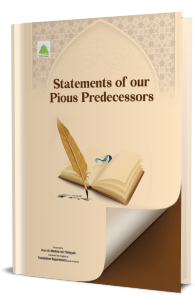
Statements of the Pious Predecessors
Mawlana Sayyid Imran Akhtar Attari Madani
Statements of Khwājah Gharīb Nawāz رَحْمَةُ الـلّٰـهِ عَلَيْه
1. No other sin will cause you as much harm as disgracing a fellow Muslim.[1]
2. If a sinner sits in the company of righteous people, it is hoped that he will become pious. If a good person sits in the company of evil people, he will be corrupted.[2]
3. A disciple will experience the sweetness of obedience when he begins to attain happiness in compliance. This is because the veils are lifted from him in that joy and the station of proximity is awarded.[3]
4. It is forbidden to laugh and joke in a graveyard as it is a place of admonishment and not a place of amusement.[4]
5. Whatever a person attained was acquired through servitude. Therefore, a disciple should not oppose his spiritual guide’s instructions in the slightest. He should listen attentively and fully act upon whatever his spiritual guide instructs him concerning prayer, glorifications, litanies, etc. It is only when he does so that he will be able to reach at a spiritual station, because a spiritual guide is like a ‘beautician’, beautifying his disciple through encouraging him in that which brings about perfection in his state.[5]
6. A spiritual wayfarer should disassociate himself from the world first, followed by his inner-self, and then embark on the path of spiritual wayfaring. Otherwise, he is untruthful.[6]
7. At the time of Quranic recital and remembrance of Allah Almighty, if one is preoccupied in amusement, his heart should soften, he should fear Allah Almighty, and he should increase in certainty of faith.[7]
The lush garden of Imam Aḥmad Razā Khān رَحْمَةُ الـلّٰـهِ عَلَيْه remains today
Sayyidunā Amīr MuꜤāwiyah رَضِىَ الـلّٰـهُ عَـنْهُ is from amongst the illustrious Companions رِضْوَانُ الـلّٰـهِ عَلَیْہِمْ اَجْمَعِیْن. It is reported in the authentic narration of Sunan al-Tirmidhī that the Messenger of Allah صَلَّى الـلّٰـهُ عَلَيْهِ وَاٰلِهٖ وَسَلَّم supplicated for him, saying:
اللھم اجعلہ ھادیا مھدیا واھد بہ
“O Allah, make him a rightly guided guide and guide [people] through him.”[8]
No one will call any of the noble Companions رَضِىَ الـلّٰـهُ عَـنْهُم a disbeliever or heretic except one who is a disbeliever or deviant himself. Allah Almighty divided the noble Companions into two categories. The first consists of those who spent and fought in the way of Allah Almighty prior to the conquest of Makkah, and the second consists of those who did so after the conquest. It was then mentioned that Allah has promised both groups goodness and that He is well aware of all that which you will do, yet despite this, He has promised you all goodness.[9] The belief of the Ahl al-Sunnah ونکف عن ذکر الصحابۃ الابخیر (We desist from mentioning the Companions except with good) is obligatory.[10]
The beautiful garden of Attar
The one who delivers a sermon should not just be a warrior in the arena of words, rather he should have the mindset of acting according to what he says. If only we all gained the same mindset and became those who speak for their own rectification.[11]
It is permissible to recite and listen to the Prophetic ode composed by every Muslim who abides by Islam’s teachings. However, because not every person possesses the ability to judge poetry according to the standards stipulated in Islam, safety lies in only listening to the compositions of reliable scholars of the Ahl al-Sunnah.[12]
[1] Dalīl al-ꜤĀrifīn, p. 52
[2] Dalīl al-ꜤĀrifīn, p. 56
[3] Dalīl al-ꜤĀrifīn, p. 50
[4] Dalīl al-ꜤĀrifīn, p. 18
[5] Dalīl al-ꜤĀrifīn, p. 03
[6] Dalīl al-ꜤĀrifīn, p. 48
[7] Dalīl al-ꜤĀrifīn, p. 24
[8] Jāmiʿ al-Tirmidhī: 3868
[9] Fatāwā al-Razawiyyah, vol. 29, p. 279
[10] Fatāwā al-Razawiyyah, vol. 29, p. 363
[11] Naik Bannay or bananay kay Tariqay, p. 207
[12] Kufriya Kalimat ke baray mai suwal jawab, p. 237

















Comments